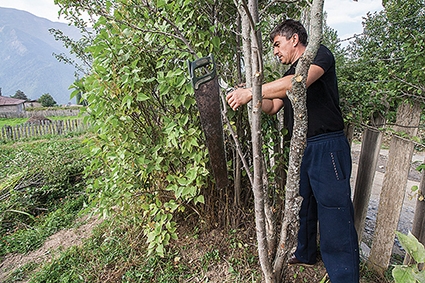Witness to a Parable: Etseri, Svaneti
BLOG
My friend from this village, surgeon, blood brother and wedding best man, Nodar Aprasidze, recently sent me a pair of guests for the night: a high-ranking Georgian Finance Police Officer and his son, also in the police. They are also refugees from Tskhinvali, South Ossetia, but their family has successfully resettled elsewhere in Georgia.
Seeing my sun-screen of flourishing fruit trees which had sprung up from being eaten down to ground level by cows in the five years since we fenced the place, they requested something with which to begin pruning. I happen to have a nice pair of secateurs, thanks to a church bazaar in the UK, which set me back a pound before I was even married and have been waiting their chance to shine. The elder of the two sharpened them with a stone and file, they asked for a saw in addition, and the work began.
I admit that the trees are somewhat wild, never having been touched by such methods since they jumped back into the land of the living. It was high time they were restored to a more civilized state which, of course, will include more fruitfulness as well. Their branches grow in all sorts of odd directions; dead and life-stealing bits cling on, sapping the main branches’ strength as weeds cluster around their bases. Ur guests dealt with all these problems.
“Look at each tree, Tony,” they said, “and decide how you want it to grow. Remove the unnecessarily competing branches as close to the trunk as you can; rub some dirt on the big cuts to help them heal. For the direction you want a particular branch to grow, cut it short a bit opposite that direction, above a budding branch off it. See the future tree in your mind, and work towards that. Be ruthless: you are doing vital work to help the tree reach its full potential and fruitfulness”.
Painful work, too, I was thinking, but whether the tree knows it’s in good hands or not, feels the cuts or not, the gardener is in charge of producing something pleasing to himself and his guests or family. He, too, feels each cut or scratch of thorn as the tree’s natural defenses operate; the blood is his, too. But he continues without hesitation to operate; no wonder such skilled people are called tree surgeons in the West, and paid well for their work!
Sometimes a tree was reduced to half or even less of its unruly former self; once or twice a nearby one was removed entirely for the sake of the other. In all such cases, the results would be more growth, more fruit, more pleasure for the gardener, and a garden tamed; again, not wild. At its best.
There were so many lessons being acted out before my eyes that it was all I could do to note them and think of anyone’s life, which I believe also needs similar painful work from outside to reach its full potential. Not merely for utilitarian ends, but for beauty, too; function and form serving together to please a higher purpose which is also outside ourselves, and for which we exist. A long-term process, as the pruning one is, over seasons and many successive years, done either in spring or fall, not just at any time. Possibly lasting from seedling stage into late life. Will I submit and become my best, or fight it and proudly but uselessly remain wild? Because unlike the tree, I have this choice.
Tony Hanmer has lived in Georgia since 1999, in Svaneti since 2007, and been a weekly writer for GT since early 2011. He runs the “Svaneti Renaissance” Facebook group, now with over 1500 members, at www.facebook.com/groups/SvanetiRenaissance/
Tony Hanmer












